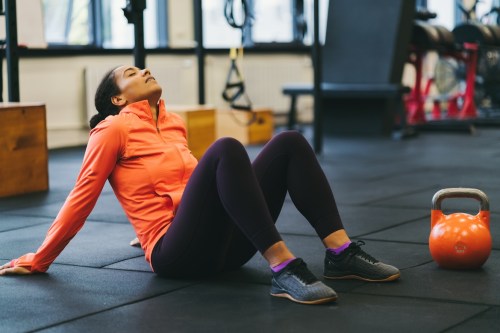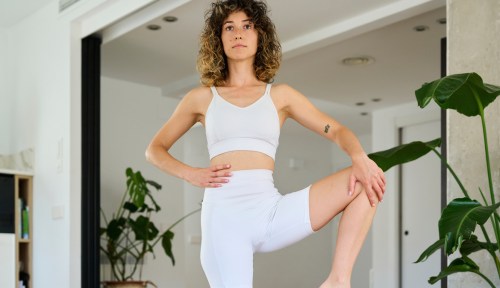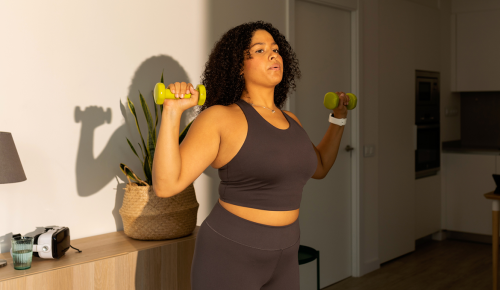When I finish a workout, how I feel afterwards can be a totally unpredictable toss-up. There’s the chatty and positive post-workout me, ready to gush about my run or how much I deadlifted. Then there’s the cozy, ready for a nap, everything-but-laying-on-the-couch-in-one-position-seems-impossible version.
Experts in This Article
exercise physiologist at the Hospital for Special Surgery
What we do during our workouts plays a role in how we feel afterward. But there are other factors that actually make a big difference, too, and will affect whether exercise leaves us feeling energized or exhausted.
Why you feel tired after a workout
“Your current state—how rested you are, when the last workout was, how much energy you have available, when you last ate and how your unique body responds to that meal, hydration, temperature, stress level, previous exercise tolerance, mindset—all factors in to how your body will respond to the next exercise demand,” says exercise physiologist and trainer Kate Baird, ACSM-CEP, CSCS, the coordinator of running and metabolic services at the Hospital for Special Surgery in New York City, says.
Essentially, how ready and rested your body is for exercise will determine how much oomph you have to give. Then, if the intensity of your workout meets your readiness, you’ll probably feel great afterward. If it exceeds it, some couch time is in your future.
“The overall demand—the time of day, duration, intensity, neuromuscular difficulty, energy needs—will determine how much work you have to perform,” Baird says.
Sleepiness, as opposed to just physical fatigue, comes thanks to a brain-body connection that translates the tax placed on your body to how you’re feeling overall. (Learn more about the difference between being tired vs. fatigued!)
If you’re feeling tired after a workout, some factors that compound this effect are the potential that you’re dehydrated, that you haven’t been sleeping well (and then exercise “adds to the deficit,” says Baird), or that you have “depleted your energy and/or you aren’t eating enough of the right fuels to power your workout.”
How to avoid post-workout exhaustion
The good news to putting an end to yawning during your workouts is that knowing that preparation and recovery factor into how you feel after a workout means that you can plan for more energized days.
“This is where weekly, monthly, and even annual programming comes into play,” Baird says. “How you manage your state and how much overall demand placed on you with each workout can impact how you feel when that workout is over.”
Baird advises that you give yourself more overall recovery after a harder workout. If you do, the payoff will come both during the workout with more rested and ready muscles, and afterwards.
“Although it will differ from person to person, exercise can produce endorphins and improve mood,” Baird says. “When you hit a sweet spot, you may just end up feeling amazing.”
Are you recovering today? Here’s a 15-minute stretch session to add in some movement even when you’re taking it easy:
FAQ
1. Is it normal to be tired after working out?
While it’s not uncommon to be sleepy after a sweat sesh, you don’t have to suffer that fate. There are ways to combat it, like making sure you’re hydrated and getting enough sleep, according to Baird above.
2. How do you stop fatigue after exercise?
Here are a few tips for making sure don’t have any post-workout fatigue, according to the Hospital for Special Surgery:
- Eat a well-balanced meal with protein, fruits, veggies, and carbs.
- Have a light protein-rich meal or snack about two hours hours before exercise.
- Drink 10 to 12 8-oz glasses of water a day and 7 to 10 ounces of water every 10 to 20 minutes during your workout to prevent muscle fatigue and dehydration.
- Warm up and cool down before and after your workout.
3. What is exercise fatigue syndrome?
According to Jacksonville Orthopaedic Institute, exercise fatigue syndrome is chronic and extreme exhaustion after workouts that may be the result of “intense physical exertion or an underlying medical condition.” In addition to feeling tired and not having energy, symptoms include:
- nausea and vomiting
- headaches
- pain and stiffness in your muscles and joints
- dizziness
- elevated heart rate
- feeling out of breath
4. Should I nap after a workout?
Sleep helps rebuild and repair your muscles so they can recover faster, according to the American Council on Exercise. However, the sweet spot for napping, according to the Centers for Disease Control and Prevention, is 15 to 30 minutes or 90 minutes. You’ll wake up from both of these nap lengths more alert because you either didn’t go into deep sleep to begin with or you completed a full sleep cycle.
Sign Up for Our Daily Newsletter
Get all the latest in wellness, trends, food, fitness, beauty, and more delivered right to your inbox.
Got it, you've been added to our email list.











